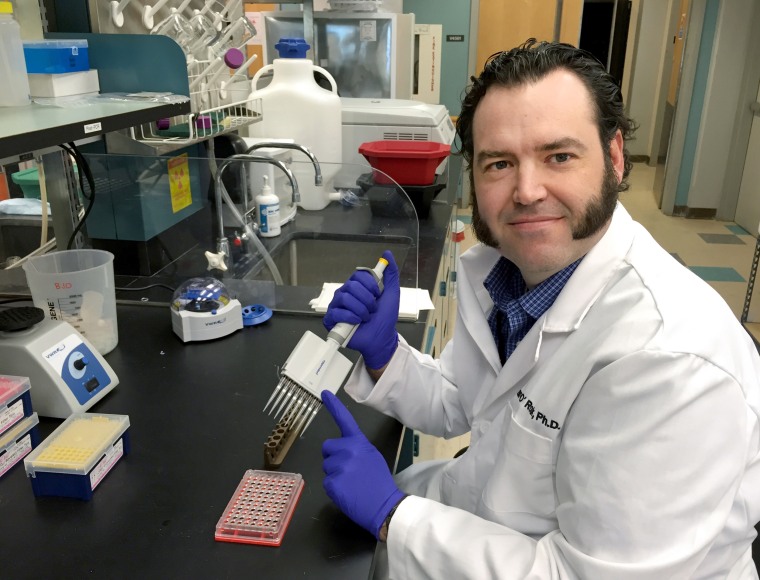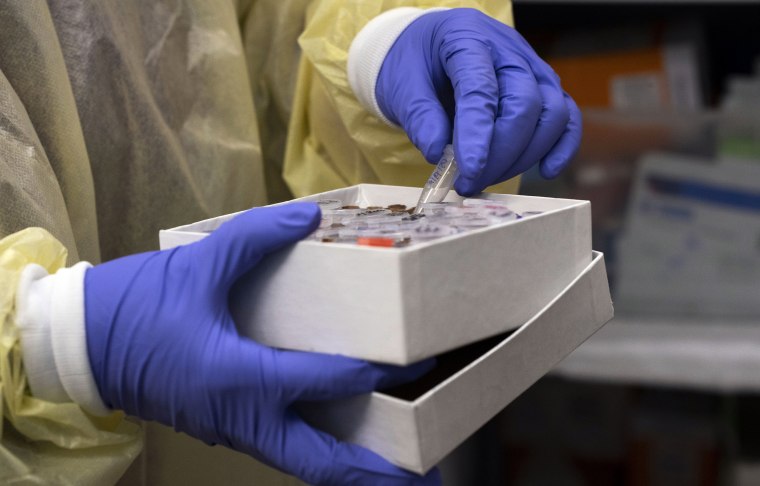As more cases of the more contagious variant of the coronavirus are detected in the United States, there's growing concern among scientists that the country hasn't been doing enough to track genetic changes in the virus, leaving Americans in the dark about the emergence of potentially dangerous new strains.
So far, at least 50 cases of the coronavirus variant first discovered in the United Kingdom have been identified in the U.S. In the U.K., rapid spread of the variant, known as B.1.1.7, sent the country into strict lockdown this week as cases surged.
Full coverage of the coronavirus outbreak
Now scientists in the U.S. are playing catch-up, racing to figure out just how widespread the U.K. variant is in America.
You can only look where the light is, and if the light is not sufficiently bright, you're going to miss a lot of territory.
"Clearly, we're not doing this enough," said Gigi Kwik Gronvall, a senior scholar at the Johns Hopkins Center for Health Security. "You can only look where the light is, and if the light is not sufficiently bright, you're going to miss a lot of territory."
It's not just the U.K. variant that American scientists are concerned about missing: New variants of viruses emerge all the time, but the country needs a system to quickly detect strains that could cause the virus to behave differently or render vaccines and treatments less effective.
Finding new strains involves sequencing the genetic code of the virus. It's a lengthy process that can take days to complete and can cost $10 per sample to $100, depending on the technology. The process uses specimens from Covid-19 diagnostic tests that would otherwise have been thrown out.
But "it's not that complicated," said Brian O'Roak, a human geneticist at Oregon Health & Science University, who has pivoted his work to sequencing the virus as part of the university's Oregon SARS-CoV-2 Genome Sequencing Center. "It's similar to other sequencing efforts that others have developed for other viruses."
However, the U.S. has sequenced only about 60,000 samples, or 0.3 percent of all cases, according to the nonprofit GISAID Initiative, one of the few international databases that houses the genetic information for more than 300,000 virus samples around the world. The U.S.'s number is strikingly low compared to the numbers in other countries, like the U.K., which has sequenced nearly twice as many cases.
"We haven't had a national coordinated system in place to do this at a high scale," O'Roak said. "Maybe now with the U.K. strain, it's really a wake-up call for many out there in the public health world."
Since the U.K. strain was found, the Centers for Disease Control and Prevention has promised to ramp up genetic sequencing in the U.S. A CDC spokesman said the agency is working with state public health officials and academic and public health laboratories to double the number of samples sequenced every week.
But some say the effort is too little, too late, because the virus is already widespread in the country.
Joe DeRisi, co-president of the Chan Zuckerberg Biohub in California, which has sequenced 10,000 samples for the state, said there is no federal program for strategic surveillance of the virus' mutations.
"There should be 1,000 sites sequencing like we do," DeRisi said. "There's just a handful doing this. If you compare it to the nation as a whole, it's pitifully small. There's a very small amount of surveillance going on."
At the Oregon center, O'Roak and his colleagues have been tracking virus mutations since the start of the outbreak.

Mutations in the coronavirus are common, O'Roak said. In fact, it appears to mutate every two weeks, which is actually slower than other common viruses mutate, including influenza. The coronavirus has probably mutated thousands of times since the original strain appeared in Wuhan, China, in late 2019, he said, adding that most of his lab's samples have mutated 15 to 20 times compared to the original strain.
"Many of these changes are one and done from a single sample and we don't see them again, and others propagate and become more common," O'Roak said.
Even for variants that become more common, most of the time the changes are silent, meaning they're tiny shifts in the virus's genetic code and don't affect its behavior. But other mutations, like those in the U.K. variant, can be significant and affect how the virus behaves.
But the more widespread the virus is, the more opportunities it has to mutate, scientists say. Besides the U.K. variant, public health officials are also keeping an eye on a South African strain that scientists fear could evade treatments and the vaccine.
Download the NBC News app for full coverage of the coronavirus outbreak
Indeed, one of the biggest fears is that a new variant could emerge that could render the new vaccines less effective. (That's why people must get flu shots every year, because the virus changes so much that the previous year's vaccine won't work.)
"We need to understand how the virus is spreading and how the virus is evolving, especially as we bring on wide-scale vaccination and treatments," O'Roak said. "We've only been dealing with this virus for a year, and we don't understand it well. But if we don't shine the spotlight on the virus genome, then we'll never know."
In the meantime, labs in the U.K. are working to determine whether the variant there will affect the vaccines' effectiveness, as well as to gain a clearer understanding of how much more transmissible it is. Friday, Pfizer-BioNTech announced the results of a study that found its vaccine was could protect against one of the more concerning mutations in the U.K. variant.
More precise contact tracing
Increasing genetic surveillance of the virus has benefits beyond identifying worrying new strains, including providing insights into how the virus traveled from person to person.
When the coronavirus spreads to another person, it leaves a genetic fingerprint, allowing scientists to compare how different strains are spreading in real time.
In the first six months of the pandemic, O'Roak and his team identified five predominant substrains in Oregon. Some were connected to large superspreading events.
Those strains, or descendants of them, are still out there, he said.
"The concerning thing is most of the early introductions, the virus's relatives, are still transmitting," he said. "That tells us — not unsurprisingly — how widespread the virus is, and it's not under control."
Tracking genetic changes can also be used to stop outbreaks.
DeRisi said his lab has been working with 28 counties in California, which has been at the forefront of sequencing. Most of the counties are using the genetic information to carry out a precise form of contact tracing. Using what DeRisi calls genetic epidemiology, public health officials can look at the genetic sequencing from the positive tests. The genetic fingerprints are then traced back to the source of an outbreak, which can be key in settings like agricultural facilities or nursing homes.
"The genetic epidemiology clarifies it and provides a clear precision map for the Department of Public Health to know what to investigate," he said. "It saves hundreds and hundreds of person hours and follow up."
Follow NBC HEALTH on Twitter & Facebook.

